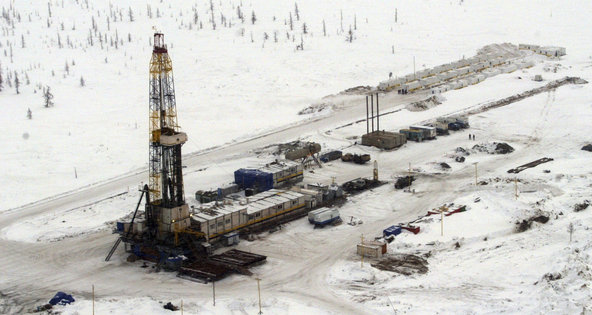The oil giant reported net income for the quarter of $9.95 billion, up 6 percent from the year before. The company’s domestic refining division is benefiting from the steep increase in domestic oil production, which has brought down the price of crude that refiners process, particularly in the midsection of the country.
But Exxon Mobil also reported a 5 percent decline in oil and gas production, with earnings from output in its upstream business falling 12 percent in the quarter. The poor results in the production business underscored the continuing difficulty of many major oil companies in replacing aging oil fields with new reserves. Exxon Mobil and other companies also are straining to make profits in domestic shale gas fields because a glut in natural gas supplies has forced the price of gas down by roughly 60 percent over the last five years.
“The company continues to be growth-challenged,” said Brian Youngberg, senior energy analyst at Edward Jones. “They really didn’t have any big projects come on line in 2012, and 2013 will be a challenge also.” He said 2014 looked better, as the Kearl project in the Canadian oil sands was expected to be fully operational by then.
Chevron, the No. 2 American oil company, also reported strong refining results, which pushed up its fourth-quarter earnings by 41 percent to a record $7.25 billion. But the company reported that crude oil output had declined by 1.2 percent.
Chevron has suffered oil production declines over the last two years, although analysts say that the development of offshore exploration projects in the Gulf of Mexico, domestic oil shale development and longer-term liquefied natural gas transport projects should enable the company to expand production by 2014.
David Lawrence, Exxon’s vice president for investor relations, told analysts that the company was developing production projects in Romania, Tanzania, Siberia, Argentina and Colombia that augur well for the future. “It’s a nice pipeline,” he said. “It’s probably as balanced a portfolio that we’ve had in a long time.”
In the last quarter, the Texas-based company tried to increase its reserves and production by purchasing 196,000 acres in North Dakota and Montana from Denbury Resources for $1.6 billion to add to the Bakken shale oil field.
Exxon Mobil bought XTO Energy four years ago for $41 billion, making it the country’s biggest natural gas producer. Many analysts have questioned the purchase since it was made when gas prices were high. But the deal gave the company experienced personnel in exploring and drilling in shale formations. The company hopes that the XTO deal will pay off once gas prices recover, and shale in Russia, Colombia and Argentina get off the ground.
Exxon Mobil’s refining and marketing earnings climbed to $1.77 billion, from $425 million in the quarter. Earnings from its chemicals business increased to $958 million, from $543 million.
But the big winners in the oil patch this earnings season have been the refining companies. Valero Energy’s fourth-quarter earnings of $1.01 billion represented a seven-year record and compared to only $45 million for the same period in 2011. Marathon Petroleum reported a profit of $755 million, compared to a loss of $75 million the year before. Both companies are replacing expensive foreign crude with far cheaper domestic crudes for refining.
Article source: http://www.nytimes.com/2013/02/02/business/energy-environment/refining-helps-profit-at-exxon-mobil.html?partner=rss&emc=rss

